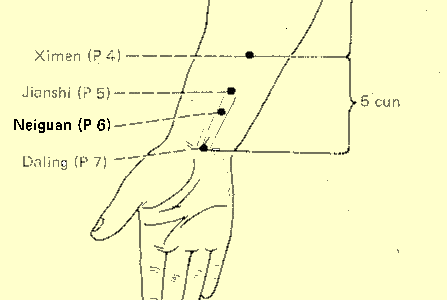One of the most commonly used points in our practice is PC6. Also known as Pericardium 6 or P-6, its Chinese name is Neiguan, which translates as “Inner Pass.” The point is located about two inches — 2 to 3 fingers’ breadths — from the inner wrist, between the palmaris longus and flexor carpi radialis tendons. Many of you know this point well: when stimulated, it commonly produces a mild electrical “zing” that sometimes radiates into the fingers and hand.
 In Chinese medicine, it’s believed that the Heart stores one’s spirit, and the Pericardium “wraps” the heart and provides protection against pathogenic factors or stress. PC6 has an especially powerful effect on regulating the heart and calming the spirit, making it particularly effective in treating both physical and emotional matters of the heart, including anxiety, insomnia, palpitations, chest tightness, or disorders of heart rhythm.
In Chinese medicine, it’s believed that the Heart stores one’s spirit, and the Pericardium “wraps” the heart and provides protection against pathogenic factors or stress. PC6 has an especially powerful effect on regulating the heart and calming the spirit, making it particularly effective in treating both physical and emotional matters of the heart, including anxiety, insomnia, palpitations, chest tightness, or disorders of heart rhythm.
PC6 is also well-known for its effect in treating nausea, whether it is a result of pregnancy, stress and anxiety, food poisoning, stomach bugs, or as a side effect of chemotherapy and radiation. This point is also useful in the treatment of motion sickness. Those motion sickness bands sold at pharmacies work because they stimulate PC6.
The next time you’re feeling nauseous, or a little anxious, or are lying in bed unable to fall asleep, take a few deep breaths while pressing PC6. It’ll calm your spirit and bring peace to your heart.
[written by Sara E.]